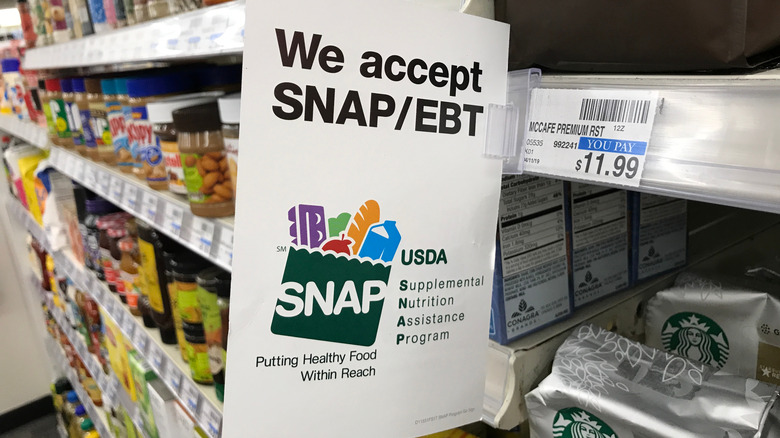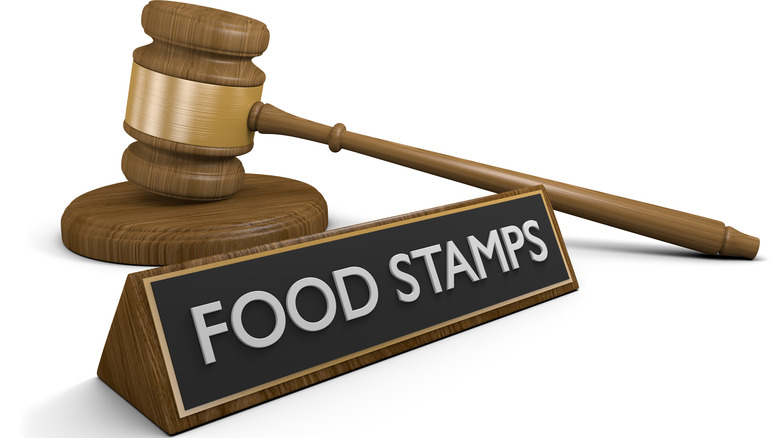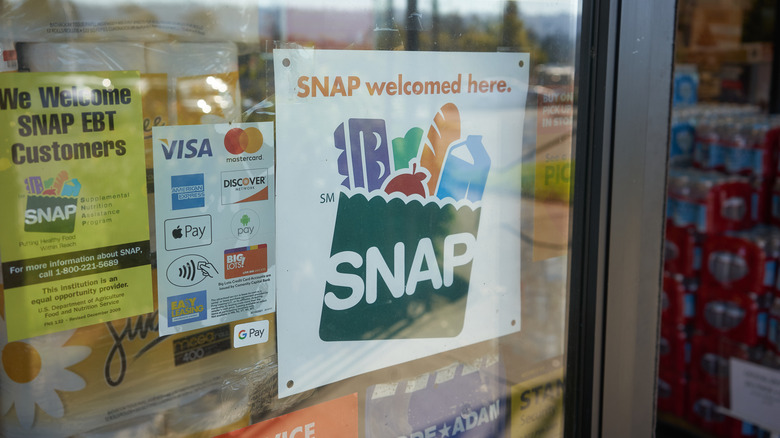The 3 States That Stand To Lose The Most From A Newly Proposed Food Stamp Bill
The Supplemental Nutrition Assistance Program (SNAP) — also known as EBT or by localized names, such as CalFresh — is a federal public safety net that helps feed people with low income who are facing food insecurity. Food-stamp funds are loaded onto a debit card, which can then be used to buy groceries. The program is designed to reduce hunger, promote nutrition, and free up funds for other basic necessities such as healthcare and shelter.
Requirements for signing up differ by state, but generally speaking, it's based upon level of wealth. As recently as 2022, a little more than 40 million individuals participated, according to Feeding America. However, this high number reflects an increase in SNAP benefits implemented during the economic turmoil of the pandemic. Those boosts have recently ended, and millions of Americans are facing hunger as COVID-19 SNAP benefits get cut.
This issue may soon get worse, as a newly proposed food stamp bill intends to make eligibility requirements more stringent. Plus, some states could be more harshly affected than others.
Republicans argue this will help the economy
The America Works Act was proposed in March, reports USA Today. Essentially, it aims to require individuals benefiting from SNAP to work. Hypothetically, this would be accomplished by raising the maximum age limit for work requirements from 49 to 65. State governments' abilities to waive requirements when job prospects are scarce would also be curtailed. Additionally, parents with school-aged children (over seven-years-old) would now need to find employment, too. More than a dozen Republicans have come out in support of the proposal, which is spearheaded by South Dakota Representative Dusty Johnson.
On his website, Congressman Johnson (a former SNAP recipient as a child) explains his reasoning for these theoretical changes. He argues that employment is necessary for self-improvement and that, given the present U.S. labor shortage, work opportunities are currently plentiful. Forcing people to get jobs will, according to him, improve the economy in more ways than one. Johnson also claims that SNAP has been abused by those unwilling to work in recent years, something which he says needs to be addressed.
Nonetheless, it seems unlikely this legislation could make it through the Democrat-controlled Senate. Such opponents of the bill claim it would harm Americans more than it would help them. A recent report that looks at how these changes might affect SNAP recipients state by state, appears to support this idea.
Alaska, Oklahoma, and South Carolina may suffer most
The Center on Budget and Policy Priorities (C.B.P.P.), in response to this proposal, published a report at the end of March examining its potential effects. It found that families and the elderly in every single state would be put at risk, should the legislation pass. Alaska, Oklahoma, and South Carolina in particular would be the most significantly affected, with more than 30% of SNAP-eligible residents impacted. Not far behind them are Alabama, Arizona, and Ohio, with 29% each. Among the least affected are Idaho, Vermont, and Washington, but even they would see about 20% put at risk. Nationwide, this amounts to roughly 10 million Americans — about 25% of those currently receiving food stamps.
According to the C.B.P.P., the majority of SNAP participants who are able to work already do so. Therefore, stricter work requirements would primarily impact people who face discrimination and a lack of resources that enable careers. Individuals who fail to prove employment within three months could then lose SNAP eligibility for three years, worsening food insecurity.
In the end, it's up to lawmakers and their constituents to decide whether this is the right path forward. However, as CBS News reports, many SNAP recipients now receiving less benefits than they did during the pandemic are already turning to food banks, which have been worrying about the impact of inflation in 2023. Will the America Works Act solve any of this or add another problem to the country's plate?


